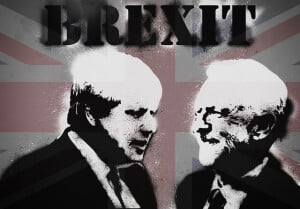Brexit’s bitter harvest

Getting your Trinity Audio player ready... |
Following the resounding defeat of the Labour Party in the recent general election of Dec-2019, bitter recriminations from the fallout continue to reverberate. Party activists that staked enormous political capital in the hope that the Labour Party would oust the incumbent Conservative and Unionist Party from power are now engaged in a series of bitter recriminations, not least over the selection of the new leader. Factions within the party, notably the Blairites, having been using the opportunity to table for a wholesale purge of the former leadership, its policies and what they have dubbed left-wing extremism.
The scale of Labour’s defeat is significant: it has returned the worse electoral result in terms of seats since 1935. In some quarters, it has even been viewed as being worse than the defeat to Thatcher of 1983. Key Labour heartlands in the Midlands and the north of England voted Conservative; in Scotland, the party appears all but finished, retaining only one out of a total of 59 seats. Some have opined the reasons for the defeat lay with the relentless media campaign conducted against the Labour leader personally, others, that the set of proposed policies were too numerous, too radical.
And yet the Shadow Chancellor remarked during an interview on the 15th December that ‘When you challenge the establishment they will throw the kitchen sink at you.’ While that statement may arguably be true, closer reflection upon the policies that he was instrumental in threading together for the Labour manifesto make this seem quite untenable.
Far from being radical, Labour’s vision in the manifesto seemed firmly within the realms of ‘establishment’ politics. The proposed economic programme relied heavily upon borrowing (with usury) from money markets and banks, thereby propping up and keeping the same elites they were alleged to be against quite firmly in place. Other noted highlights from the manifesto were the continued membership of NATO, remaining under the US security framework; revamping the armaments industry and retaining Trident – the latter retaining pretensions for Britain to think it’s a global power when it’s not. Active promotion of the trans-humanist agenda, forcing this in schools with legislation together with ‘climate emergency’ policies would not be altogether out of step either in globalist policy debates at Davos. So where was the radicalism?

Critically, what lost the Labour Party the general election was the contradictory, confused approach to Brexit. Labour adopted the call for a second referendum, with many in the party insisting to overturn the result of the 2016 referendum. Having sought to block all attempts at seeing the original referendum result implemented in parliament during the intervening period, many of the Parliamentary Labour Party (PLP) were openly campaigning to remain, placing them at odds with large swathes of their own electorate, as well as aligning the policy choice firmly in line with those factions of the establishment desiring the same. It is no surprise that the vast majority of traditionally Labour-held seats in the midlands and the north, opted for the single-slogan of ‘get Brexit done,’ by the Conservatives.
For many Muslim supporters of the Labour Party, much of this policy debate seems to have been of little consequence. As is customary, prominent Muslim speakers within the UK, but also surprisingly from North America, publicly came out to endorse Labour and its leader. While seemingly oblivious to the actual policy debates, the sloganeering was palpable.
Yet unlike previous elections, there was a vocal shrill cadre of activists who sought to shout down, ridicule and even castigate any who would even dare seek to question the legitimacy of supporting a non-Islamic establishment party, let alone dare voice a criticism of Corbyn. To even question the ‘vote Corbyn’ crescendo was to have the accusation of being a ‘lackey for Zionism’ levelled, since it was alleged that only Corbyn, the Labour leader, would ‘save Palestine.’ The fact that the Labour leader could not fight the smear of antisemitism domestically nor exclude avowed Zionists from his own benches (the former deputy leader as well as the Shadow Foreign Secretary a case in point) seemed to be conveniently overlooked. How could Corbyn go up against the United States and all its Middle Eastern allies allied to Zionism when he couldn’t even combat the fifth column in his own party let alone the media?
That didn’t even come as a great surprise, since this election, like many others before it, saw the pro-Labour Muslim cadre show once again an utter ignorance of some basic political facts. Given that appointment to the offices of state, including that of Prime Minister are not directly elected, the question of how one would actually ‘vote Corbyn,’ while not being registered in Islington North, wasn’t a factor that any Muslim personality liked to note. Moreover, when challenged to explain the individual policy adoptions in the Labour manifesto that they were tacitly endorsing, Muslim advocates seemed to have been utterly oblivious to them. Vocally being outraged against the LGBT-agenda being taught schools – yet supporting a party that would mandate this by law, are peculiar contradictions that can’t be easily overlooked.
As usual, in the justification for supporting the establishments non-Islamic parties there was yet again, the trite appeal that this necessity was borne of a ‘lesser evil,’ so that this may avert a ‘greater evil.’ With many mindlessly parroting the need to avert a ‘greater evil’ very few stopped to question who is tasked with making the determination of what constitutes the lesser or greater evil? But here also, a glaring lacuna exists. In the drive to browbeat all eligible Muslims to conform, why was there no consideration given to the effect of Muslims adopting political ideas, even philosophies that are avowedly secular? If the short-term aim were to have all eligible Muslims voting for establishment political parties, does that satisfy the underlying judgement that this is a sacrifice of averting a ‘greater evil’ is worth making, even if those same Muslims have an entirely secular political outlook completely divorced from Islam? It would seem, that the preference for endorsing one form of falsehood over another has clouded judgements to obscure real dangers.
Why were so many prominent Muslim speakers insistent that everyone should vote for one of the establishment parties (the majority, for Labour) and / or emphasising the necessity of participation itself? It is striking that many of these same speakers are very often conspicuously silent regarding regimes within the Muslim world. At times, some of them have gone to great lengths to either justify such regimes or indicate that any opposition to them constitutes going beyond the bounds of Islamic principles.
From Ziyād ibn Ḥudayr, he said: Umar bin al-Khaṭṭāb said to me: “Do you know what will ruin Islam?” No, I replied. Umar said: “Islam will be ruined by the faults of scholars, the arguments of hypocrites over the Book and the judgment of misguided leaders.” [Sunan Dārimi]
There is, it would seem, a very subtle but insidious ploy at work here. A cynic may claim, that at root, the issue of political participation via supporting non-Islamic parties is not and has never been about studiously studying the nature of political participation and seeking to derive an Islamic ruling from the corpus of texts. Rather, it is an exhortation to maintain the status quo at all costs. Its function is dual-fold. Within the Muslim world, this helps to stave off any criticism or intellectual challenge being mounted to vicious tyrannical dictatorships. In Europe, it is to channel all political activity through the establishment framework. The net result is Muslims who identify only ‘religiously’ as Muslim, but within the bounds of political ideas, are thoroughly secular. Is it any surprise that many young Muslim activists for the establishment parties openly identify themselves in political terms that are anathema to the very Deen they claim to adhere to?
The lack of any actual political ideas to emanate from a chorus of prominent Muslim personalities during the election perhaps shows just how the ‘religious’ / secular divide has taken deep root. Reinvigorating the call to a complete Islam, including its political principles founded upon justice seems to now require even greater attention than previously thought.




